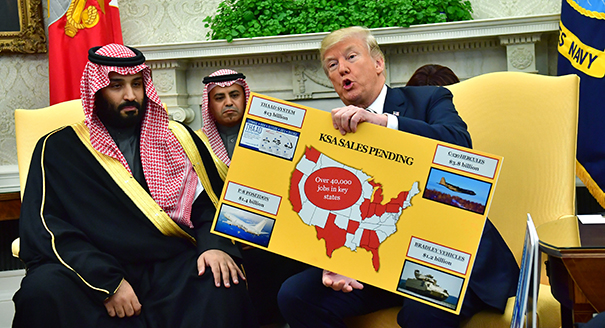Dexter Filkins | Staff writer at the New Yorker, author of The Forever War (2009, Vintage)
The surest thing that can be said about the next two years of U.S. politics is that they will be consumed by U.S. politics. The main objective of the new Democratic majority in the House will be to investigate and interrogate President Donald Trump and the Trump Organization by every means at its disposal: subpoenas, hearings, the summoning of witnesses, and the scrutinizing of documents. The main things the new Congress will be after is evidence of Trump’s dealings with Russia and corruption in his businesses.
This, given what we know about Trump’s character, will likely produce a series of volcanic reactions from the Oval Office—more outbursts, more surrealistic press conferences. The battle will be ugly and protracted, possibly nastier than anything we have seen in the previous two years. For the first time, Trump will face real and institutional opposition.
What does that mean for the Middle East? The best bet is that the region will be ignored. The Trump team came into office with grand designs to reshape the Middle East, principally by isolating the Iranian regime and perhaps spurring an uprising against it, and possibly securing an unhappy deal for the Palestinians. All that is on the back-burner now. Trump will not have the time or energy for it. His son-in-law, Jared Kushner, will almost certainly be distracted, too. The most likely thing will be management of the status quo.
The one danger is that the Middle East may act on its own, by producing a crisis that will demand the president’s attention. If that happens—I’m thinking of Richard Nixon, Watergate, and the Arab-Israeli War of 1973—the temptation to intervene could be very real. We don’t yet know where that crisis will be or when. But if it comes, it will be difficult for Trump to ignore it.
Sarah Yerkes | Fellow in the Carnegie Middle East Program, former member of the U.S. State Department’s Policy Planning Staff, former research analyst for the Pentagon’s Joint Staff Strategic Plans and Policy Directorate
Much of Congress’ approach to U.S. policy in the Middle East has taken on a largely bipartisan character over the past years. However, the midterm elections brought in (and pushed out) a few key players in this space. Thus, we can expect to see a Congress that is more critical of traditional U.S. allies, such as Saudi Arabia, Egypt, and Israel. For instance, on Egypt, the defeat of Dana Rohrabacher, one of the staunchest supporters of President Abdul-Fattah al-Sisi’s regime leaves room for more pushback on Egypt’s human rights abuses.
We will also likely see a challenge to the traditional pro-Israel narrative within Congress. Three new members—Alexandria Ocasio-Cortez, Ilhan Omar, and Rashida Tlaib—have all been vocally critical of Israel. Finally, we will have a better-informed Congress, as a few of the newly elected members are bona fide foreign policy experts—most notably Tom Malinowski, the former assistant secretary of state for democracy, human rights, and labor.
David Kenner | Beirut-based reporter, formerly Middle East editor of Foreign Policy magazine
Even before the final ballots were counted in the U.S. congressional elections, the Trump administration had announced that it would stop refueling aircraft of the Saudi-led coalition participating in the war in Yemen. But if President Donald Trump hopes that this move will forestall efforts by the Democrat-controlled House to challenge his Yemen policy, he will be disappointed.
The most tangible step that House Democrats can take over Yemen is to cut off arms sales to Riyadh. A Saudi weapons deal passed narrowly last year. However, in the aftermath of the killing of Jamal Khashoggi in Saudi Arabia’s Consulate in Istanbul and Democratic gains in the House, the Saudis could face unprecedented hostility on Capitol Hill.
However, it’s the less tangible repercussions from the midterm elections that should keep Saudi officials up at night. House Democrats can now organize hearings on Yemen, solidifying public and elite opinion against Saudi Arabia’s war. That will bring us closer to the day when maintaining the U.S.-Saudi relationship is no longer the consequence of a bipartisan consensus in Washington, but a partisan flashpoint.
Geoffrey Aronson | Chairman and co-founder of The Mortons Group, a Middle East consultancy
The new Democratic majority in the House of Representatives confronts a range of foreign policy issues relating to the Middle East. Whatever the issue—Iran sanctions, expanding Russian influence in the region, Israel-Arab relations—the broad political offensive against President Donald Trump and the Republican Party in the run-up to the presidential and legislative elections in 2020 is the overriding context in which these issues will be framed and executed.
This suggests a policy posture from the right—critical of Trump’s policy initiatives as being insufficiently “tough” on Syrian President Bashar al-Assad and Syria’s reconstruction, Hezbollah, Russian “expansionism,” and Iran in all its dimensions. Support for reducing or terminating U.S. collaboration with Saudi Arabia and the United Arab Emirates in the war in Yemen may be a noteworthy exception, where the new Democrat majority in the House may see political value in a policy challenge from the left.








